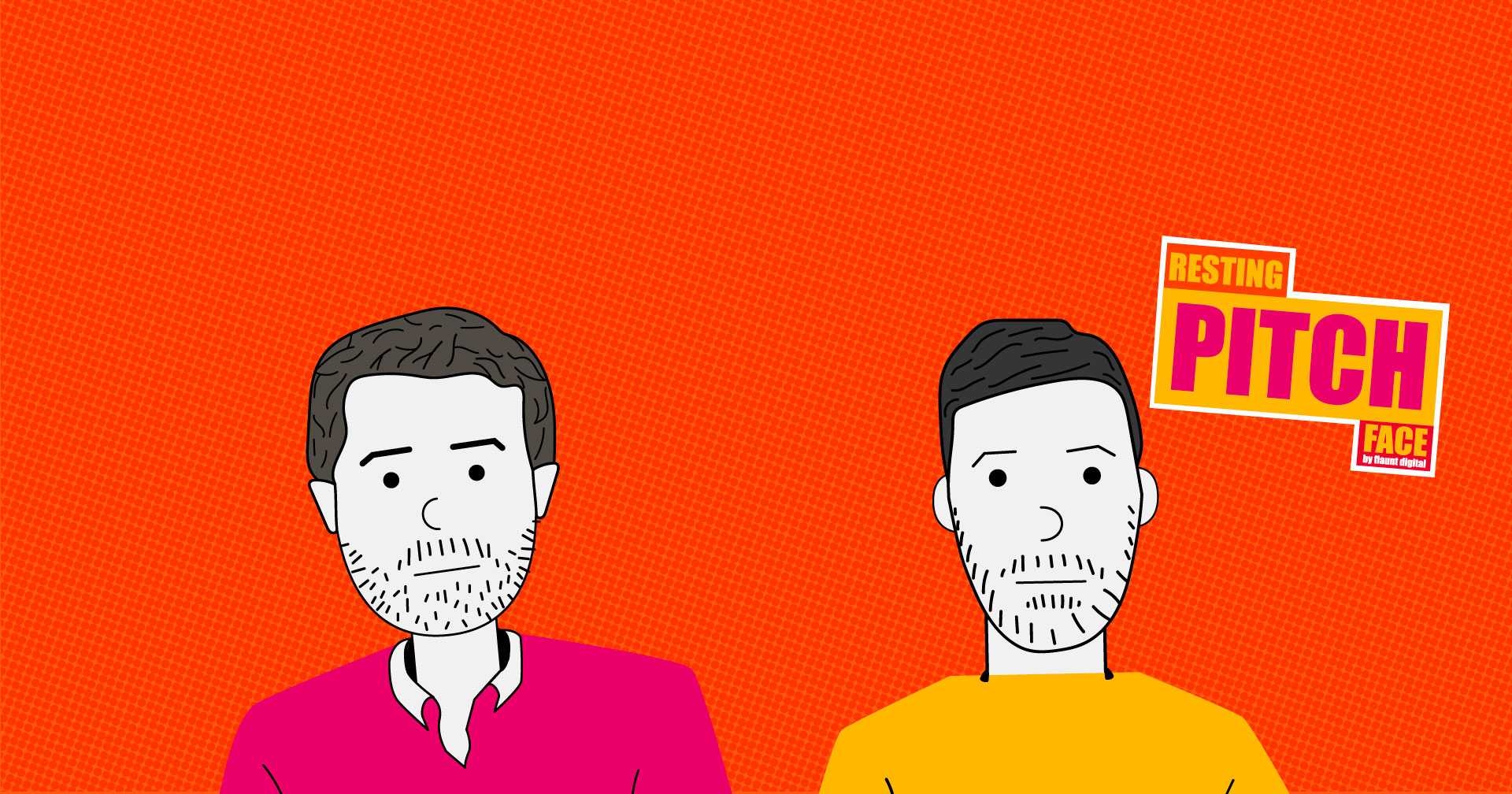Resting Pitch Face EP 3: Boldly go… Getting a job in digital
In this episode of Resting Pitch Face, we’re talking about recruitment. We’re focusing on outdated hiring processes, specialisms and what employers think of those creative CVs.
Listen on Spotify or Apple Podcasts or subscribe to our YouTube channel for weekly episodes.
See below for a full transcription of episode 3.
VIDEO TRANSCRIPT
Lee: That’s actually quite a nice story because there’s a handful of people that have joined Flaunt that and being brought into the business either by speculatively sending the CV, or just not sending the CV at all and it being conversation-based.
Dan: Well, I find the interview process that we probably all immediately think of, the standard interview process of job advert, “Oh, I fancy that.” Put my CV in, get invited to an interview, two interviews maybe, find out. I don’t think it matches our industry. Well, it certainly doesn’t…in my opinion, I don’t think it matches our industry, but not just our industry. I don’t think it’s necessarily just a digital marketing thing that it doesn’t match. But just speaking from experience, I think you’re right. Like, conversations, getting to know people fit-wise. I wouldn’t know what I’d be like in an interview now, like, a real formal process. Wouldn’t be for me.
Lee: Yeah. It is a little bit broken. Formal. I think that’s becoming unstuck there. I don’t think there’s many places that have, like, such a rigid interview process unless you’re a big, massive corporate.
Dan: Twenty years ago…Like, fucking hell, 10 years ago you’re faced with, like, grad programs. You know, like, the big KPMGs and all that sort of stuff, and I always fancied going into marketing at that stage. That was all…they’re a horrible process. I remember. Quite funny actually. I remember having to do my first ever…so at one point, at one stage of the process, of the grad program application process for Morrisons, was…at 1 stage of about fucking 25, was a shoot a video. Like, introducing yourself and then questions pop up on the screen and it pauses, video capture pauses, and you scribble down some notes up for that question and then it…I can’t remember. Say, five minutes it might give you, and then, bing, we’re recording again and you’re back on looking at yourself. As a graduate, I remember sitting in the kitchen wearing a suit and just thinking, like, that compared to, like, when we sat down two and a half, three years ago in a coffee shop based on the fact that I said I’ve been made redundant on LinkedIn and you spotted the post. And we just had a chat.
Lee: I can’t remember the specifics. I can remember the post, but I can’t remember the specifics of…there was a… I think it was your brother that commented.
Dan: I think you said someone’s comment resonated with you more so than the post if you know what I mean? Like, relative to the post. Because the post was just…
Lee: Oh, I need to go back and find that. It was something that your brother said about a quality that you carry. Like, it was either something like kindness or…it was something that struck a personal chord to me that made me reach out.
Dan: You definitely made reference to that when we first met, or maybe not when we first met, but very early on you told me. And that’s an interesting way of getting a job, putting it that way, made redundant, post it out on LinkedIn. I had a fairly okay-sized following, and you know what it’s like if you say you got made redundant. You get lots and lots of recruiters, which isn’t a bad thing at that…you know, when you’ve been put in that position from a then former employer. It’s not a bad thing to have people popping up. Though, the post did really well, basically.
But yeah, you definitely referenced someone’s comment, and I think it was either brother or dad or someone like that, family member. And that’s quite nice to look back on and think that was the way that I’ve ended up here now two years later or whatever.
Lee: It was definitely a reference in the comment. I’m pretty sure it was your brother on a personal level, on a quality that you had that was something that…for the role that we were filling being the sales position was something that I was so keen on that I wanted to follow up.
Dan: Well, that’s what happened, didn’t it. You messaged me, got my email address. We exchanged email addresses that way I think. I think. And then we met within two days, something like that. Had a chat. You brought me back here to meet the guys, meet the team that existed then, which I can’t believe the size of it compared to now. And that was it, wasn’t it? That was how it worked.
Lee: I’m a huge believer in that. Put yourself out there. Whatever guise that might be, sending your CV and putting a message out on LinkedIn. Obviously, that was your world and you had reach in that space. And we have people, several people that we’ve employed off the back of that, and people that we employed on a personal level above skill level that now are some of the greatest employees that we’ve got that have been brought into the business on a personal level being a genuinely nice person. And then seeing in them the skills that we think we can harness and leverage that are now absolutely smashing specialisms.
I love that. If I could recruit every single person within the business in that same way and along that same path, that’d be ideal.
Dan: Do you like speculatives as well, then? So, you’ve not necessarily got a position in mind at whatever stage we’re talking about but you’re getting…
Lee: …who drops in. If someone comes at me off their own back, I will genuinely spend time trying to think where I could put that person within the business. Because the intent to work for somebody, to work for a company, is the mindset that I want. I think sometimes when people are getting into an industry, or getting into a career, especially out of uni, I think a lot of people are on a path that’s predefined because of what they’re studying and because of what they’re being told. I think if you’re actively putting yourself out there, it’s rare that you find someone that has studied to do a profession that is passionate about it then finds themself in a perfect position role-wise. Obviously, being on a course at uni and doing that, and being skilled at something ahead of starting a role is advantageous.
But getting into a position where you put yourself out there, and someone takes that chance to put you into a role and build an opportunity around you, longevity all day long. You’re gonna do well there. You’re gonna succeed there because you’ve got mutually vested interests, both as the business and as the candidate. And we’ve got more than a handful of people that have come in that way.
Dan: It’s amazing to think, like, you’re a big believer and you’re pro-speculative emails, CVs, messages on LinkedIn, or whatever. Like, you’d give the right candidate from the outside looking in the time of day. It’s amazing to think of those…my client-side experience. So, I used to work at the Yorkshire Bank who are now Virgin or whatever. They just can’t do that. They can’t accept speculatives, or they couldn’t when I worked there. And it just…it’s almost like a shame to think of both the graduates or the candidates who are missing out going into an industry for whatever reason they fancy and, you know, they want to be actively getting themselves into.
And unfortunately, there’s red tape in certain industries that they just can’t…you know, they can’t break the door down. There’s no time of day for them. That’s a bit of a shame thinking about it because it’s not…your approach isn’t everybody’s approach, and we understand that some industries have rigorous…there’s another word for that but rigorous, you know, hiring processes. And there’ll be some amazing candidates in there that just can’t get beyond these stupid processes. And I guess we’re fortunate…you’re fortunate to be able to offer conversational help at that stage to the right people. But there’s gotta be tons that are missing out.
Lee: Well, yeah. I mean, that’s another thing. It’s becoming more of a rarity getting CVs through from candidates alone, speculatively that aren’t applying for a role. And I will always either look long and hard at how I can potentially bring that person in. But if I can’t then do that, I will pass that along to someone I think is relevant. I’ve done that for clients. I’ve passed CVs that weren’t a right fit for us onto clients that I think are a right fit. And it’s just such a different scale to being in the position where you’re hiring for a role, where there’s candidates coming in that are all putting the same information across to you, versus the process of opening a conversation and having an informal process, because I believe that that person could add value to the business. And they’re in a mindset where they want to be in a role or in a career, and their intent at that point is they wanna go after it, they wanna do it. And that matches us as an agency, which is why I think it works well. And it’s just becoming…It’s just we’re seeing it less and less.
Dan: I think employer branding is something that’s talked around a lot in there, but I really genuinely do believe, like, from a marketing perspective, we’re going out all guns blazing both from an employer branding and recruitment perspective, be it right now or in the future. And also, from a marketing perspective as an agency and for the brand, the agency brand, and for new business purposes. But employer branding for me is a term that I don’t know if I knew about it maybe five years ago or so. But, like, personal branding is now the thing. Employer branding’s massive, isn’t it? Personally, and I’ve not really hired that many people, in my career you have…Surely employer branding plays a big part in that…with it not being that cliche buzzword that you just chuck around, like, the next bloody one that comes on.
Lee: That’s exactly what I was gonna say. We’re going back to previous episodes where we’ve discussed myths in agency. And that forced superficial view that people get of agencies. How are people that have never experienced agency life, or that are picking a role that they think…based on the information that they have at hand, supposed to judge. That’s why you’re seeing vast amounts of companies doing everything they can to make themselves look as attractive as they can from the outside in. But what that is doing is stopping the urge for people to be proactive in seeking those opportunities. The people that are in that position where they’re seeking those opportunities are then doing their research and seeing so many people, agencies, brands, companies putting their shop window up that they’re just gonna end up spraying their CV out, which makes the genuine opportunities where I would like to live, when it comes to recruitment, just getting less and less.
And it’s something that’s happening more and more and brands are cutting down. Employers are cutting down. Talent pools are small.
Dan: Have you ever had any really creative…? You know, you see these on LinkedIn and think, have you ever been party to any creative approaches? They don’t even have to be wildly creative. It’s just…
Lee: I mean, nothing at the extreme end of the scale. I know of, I’ve never been on the receiving end, unfortunately. But I have received applications that didn’t relate to anything, completely didn’t relate to anything, and were even in a completely different discipline where I’ve still created a role.
Dan: I was gonna say that to you. I’m presuming there’s a good…end in error than just doing…you get a lot of shit and they’re a load of shit.
Lee: I’ve created a role just based on the tenacity of the applicant and then being in the…what I consider luxurious position of being able to work with that person long enough to understand their capabilities and then put a path in front of them which was mutually agreed, which they have then absolutely smashed and excelled at. So even if candidates sat there thinking, “This isn’t relevant to the role that this business offers, or the role that I want to get into.” Still…
Dan: I think candidates are…I’ve been there. You can get really disheartened and almost disillusioned then with the whole process. You know, you kind of…in your head, you made those sweeping statements like, “What’s the point in my putting this CV in at this point, or speculatively sending this message?” Because from my experience, I’m getting nowhere. But I think there’s a message from what you are saying there that there are people like you and like us out there where they will genuinely read your email, your CV, your LinkedIn message, and maybe…like you say, you as a candidate might think that you’re not putting the best foot forward versus all these other candidates, but you as the hiring person, might be able to spot something in the middle of a sentence that they will take for granted in their message to you and you go, “Shit. That’s intriguing enough.”
Lee: I know full well that I’m not the only person in a position like mine that would go out of their way to try and spot a skill or something that they can grab hold of that they then can apply to a role or a fit within a business. I know that that…I’m not unique in that. I do that and I hold that in high regard, but I’m not unique in that. So exactly what you’re saying there where it can be…on the candidate side of the table, be disheartening. I don’t think those opportunities are slim. I think you’d be surprised at how many people would respond to that.
Dan: You just have to do it. It’s quite funny because we’re talking about this in day-to-day sales world, aren’t we? You need to do it at such a volume but obviously, you need to be in control of that volume. So, in other words, the spray and pray type approach. Don’t do that. But for every 10 speculative approaches, obviously, it’d be amazing if you got 100% hit rate and you get replied. But realistically, you need to lower your expectations and expect, you know, one or two, for example, to respond to you. It’s the same in sales when we’re thinking about outreach, obviously, to generate new business. The thing that I would pick up on if I’d have heard what you’ve just said there is that potential candidate or, you know, someone on the lookout is, keep going with the speculative approaches and trying to generate a conversation and look…that be almost your objective as well if you’re comfortable, you know, doing that. I know some people would just wanna go down a more formal route of waiting for a job advert, put your CV in, wait for an interview. But like you said, you know that you’re not unique in that, but there’s enough there for me to take heart from if I was applying for jobs to go for it. So definitely go for it.
Lee: Yeah. I think digital is such a vast space. Getting into it at any level is…I don’t wanna say easy because it’s not. Because when you get beyond a certain level, you need to have expertise in a certain area. But getting the opportunity to either gain experience in what you’re wanting to do or open a door enough to get in at a company that will value you, should be straightforward if you’ve got the tenacity to go after it.
Dan: Put it in relative terms to other industries. Digital is more of an open door.
Lee: One hundred percent. And I think whilst there’s a skills shortage for digital, there’s also the opportunity to get your foot in the door and progress rapidly at speed. Digital…a year in digital is 10 years in another industry.
Dan: Think of some of the people that we work with. Perfect case studies for that.
Lee: So, if you can realize that you’ve got something to contribute to an area of that sector, go for it.
Dan: Fucking go for it.
Lee: One hundred percent.
Dan: Why not?





